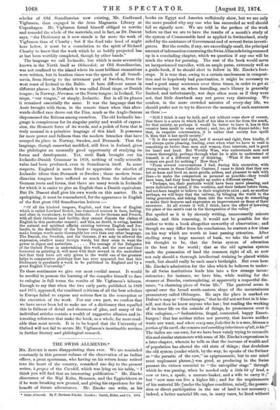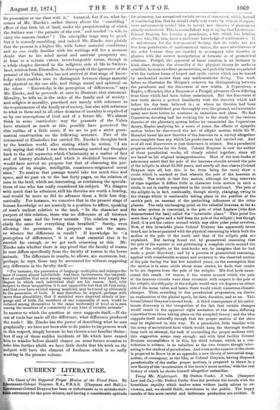THE SWISS ALLAIENDS.*
MR. ZDWICE is more disappointing than ever. We are reminded constantly in this present volume of the observation of an Indian officer, a great sportsman, who having on his return home retired into the heart of the country, remarked one day to the present writer, apropos of the Cornhill, which was lying on his table, "I think you will find that an interesting publication." Mr. Zincke discourses of the Rigi Kulm, Bruunen, and the Eggischhorn as if he were breaking new ground, and giving his experience for the benefit of future adventurers. Mr. Zincke can write, as his • Swiss 2111mendr. By F. Barham Zineke. Loudon: Smith, Elder, and Co. 1874. books on Egypt and America sufficiently show, but we are only the more puzzled why any one who has succeeded so well should fail so signally now. We are told in the preface of the work before us that we are to have the results of a month's study of the system of Commonable land as applied in Switzerland, study aided by the assistance of Government and of several Swiss investi- gators. But the results, if any, are exceedingly small, the principal amount of information concerning the Swiss Allmends being summed up in a concluding chapter, which we question if any one will be much the wiser for perusing. The rest of the book would serve an inexperienced traveller, with an ample pufse, extremely well as a guide-book, if he should elect to follow in Mr. Zincke's foot- steps. It is true that, owing to a certain carelessness in composi- tion and to hopelessly bad punctuation, it might be necessary to read a good many sentences over three times, in order to get at the meaning ; but as, when travelling, one's library is generally limited, and unfortunately, wet days often seem as if they were not, that little drawback may not prove very distressing. We confess, in the more crowded minutes of every-day life, we should prefer not to try to discover the meaning of such sentences as these :— " Still I think it may be held, and not without some show of reason, that there is a sense in which half of his idea is not far from the mark, for that society, as perhaps it would be better to have it, has in this country been spoilt to some extent; and, too, at the dinner-table ; but that, as respects conversation, it is rather that society has spoilt it, than that it has spoilt society." "It is the savant and right, and if savant and right, then kindly, if not always quite pleasing, reading, even when what we have to read is. something no better than men and women, than interests, and is good for heart and head. But Worldly Wise, who understands men and women thoroughly, perhaps through what he is able to understand of himself, is of a different way of thinking. What if the men and women are good for nothing ? How then ?'" "From several conversations I had, during this excursion, with young women in these Catholic Cantons, I came to think that they are not so keen and hard as, more gentle, artless, and pleasant to talk with than—to make the comparison as personal as possible—they would have been, had they been brought up under a different system." "Perhaps, too, their portraits would have been more pleasing, and more indicative of mind, if the worthies, and their fathers before them, had not been taught to believe in their troglodyte saint ; and, as another perhaps, we will hope that the railway, by bringing the world to the- rising generation, and taking them into the world, may do something to make their features and expression an improvement on those of their ancestors. At all events it will, I think, have the effect of lowering the place of the saint's coat in the therapeutics of the valley."
But spoiled as it is by slovenly writing, unnecessarily minute details, and thin reasoning, it would not be possible for the author to write a book altogether unworthy of observation ; and though we may differ from his conclusions, he scatters a few ideas on his way which are worth at least passing attention. After shelling away a large amount of husk, we take the kernel of his thought to be, that the Swiss system of education is the best in the world ; that as the old agrarian system made the possession of land the common right of all, so now not only should a thorough intellectual training be placed within reach, but should really be each man's birthright. But even here Mr. Zincke's admiration for the idea which he believes to under- lie all Swiss institutions leads him into a few strange incon- sistencies; for instance, we have him, while waiting for the steamer at Buochs, contemplating, at apparently a respectful dis- tance, "a charming piece of Swiss life." The pastoral scene is spread over the broad south-eastern slope of the mountainous promontory called Obburgen. He says the place is marked on Dufour's map as " Ennetburgen," that he did not set foot in it him- self, nor does he know anyone who has ; but reading the working of its inner life on the outside of things, he pronounces over it this eulogium,—" Industrious, frugal, contented, happy Ennet- burgen I that has neither riches nor poverty, that knows neither waste nor want, and where every man feels that he is a man, because a portion of the earth, the common and ennobling inheritance of all, is his!" The italics are our own, for we have been vainly trying to reconcile this and similar statements with some of Mr. Zincke's expressions in a later chapter, wherein he tells us that the increase of wealth and of population has altered the old state of things ; that doubtless the old system (under which, by the way, he speaks of the Switzer as "the parasite of the cow," an epigrammatic, but to our mind most unpleasant phrase,) was good, as producing in the Swiss peasant the virtues essential to "the caterpillar stage" through which he was passing, when he needed only a little bit of land, a cow or two, a spade, a manure-basket, and a wife to carry it ;" but "now man can live a higher life ; and for the requirements of his material life [under the higher condition, mind], the posses- sion or direct participation in the use of laud is not necessary ; indeed, a better material life can, in many cases, be lived without comes of Mr. Zincke's earlier theory about the " ennobling " effect of that little bit of land, under the proprietorship of which
the Switzer was "the parasite of the cow," and needed "a wife to carry the manure-basket " ? The caterpillar stage may be good, but it is scarcely ennobling, and indeed Mr. Zincke says plainly that the present is a higher life, with better material conditions;
and no one really familiar with his writings will for a moment doubt that to his mind moral and material prosperity are, at least to a certain extent, interchangeable terms, though in a whole chapter devoted to the religious side of life in Switzer- land, written from Einsiedlen, he does speak of the ignorance of the peasant of the Valais, who has not arrived at that stage of know- ledge which enables man to distinguish between things material and physical on the one side, and things moral and spiritual on the other. "Knowledge is the perception of differences," says Mr. Zincke, and he proceeds at once to illustrate that statement. Morality, he tells us, is the order of the family and of society ; and religion is morality, practised not merely with reference to the requirements of the family or of society, but also with reference to what in these and in all other domains of morality is required of us by our conceptions of God and of a future life. We almost think in some inarticulate way the peasants of the Valais have attained as much as this, possibly have perceived the dim outline of a little more, if we are to put a strict gram- matical construction on the following sentence. Part of the ceremonial at Einsiedlen has carried Mr. Zincke's thoughts back to the heathen world, after stating which he writes, "I am only saying that what I was then witnessing carried my thoughts back to the old mysteries which Christianity as a matter of fact and of history abolished, and which it abolished because they would have served no purpose but that of obscuring the per- ception of its simple, intelligible, conscience-originated moral aims." To analyse that passage would take too much time and space, and we pass on to the last forty pages, on the relation of man to the land, which are interesting, as containing the specula- tions of one who has really considered his subject. We disagree
with much that he advances, still his theories are worth a hearing, and would be more so did he advance them a little less dog- matically. For instance, we conceive that in the present stage of human knowledge we are scarcely in a position to affirm, speaking , -of man's earliest relation to the land, "In the character and purport of this relation, there was no difference at all between sovereign man and the lower animals. The relation was pre- cisely the same for everything that breathed." Surely, even allowing the premisses, the purport was not the same, or whence the difference in result ? If knowledge be "a perception of differences," it is at least essential that it be carried far enough, or we get such reasoning as this. Mr. Zincke asks whether there is any proof that the faculty of reason in man differs specifically from the faculty of reason in the lower animals. The difference in results, he allows, are enormous, but,
erhaps, he says, those may be accounted for without supposing any difference in the faculty itself :—
" For instance, the possession of language multiplies and enlarges the sea of reason almost indefinitely. And then, furthermore, the inequali- 'es of condition that exist among mankind determine very largely the agree in which each individual shall use his reason. And, with spect to these inequalities, it is not impossible but that all that exist, d that ever have existed among mankind, may be traced up ultimately o the possession of tools. It may therefore be argued, perhaps with Ore than plausibility, that if mankind were deprived utterly of lan- guage and of tools, the members of any community of men would be reduced among themselves to the same uniformity of level as is seen among the members of a community of any kind of sociable animals."
In answer to which the question at once suggests itself,—If the use of tools has made all the difference, what difference produced
the tools ? Mr. Zincke has the power of describing what he sees graphically; we have not been able to do justice to his present work
in this respect, simply because he has chosen a too familiar theme ; but if any of those sudden incidents of life which have caused him to wander before should chance on some future occasion to take him further afield, we have little doubt that his work on the subject will have the element of freshness which is so sadly wanting in the present volume.































 Previous page
Previous page